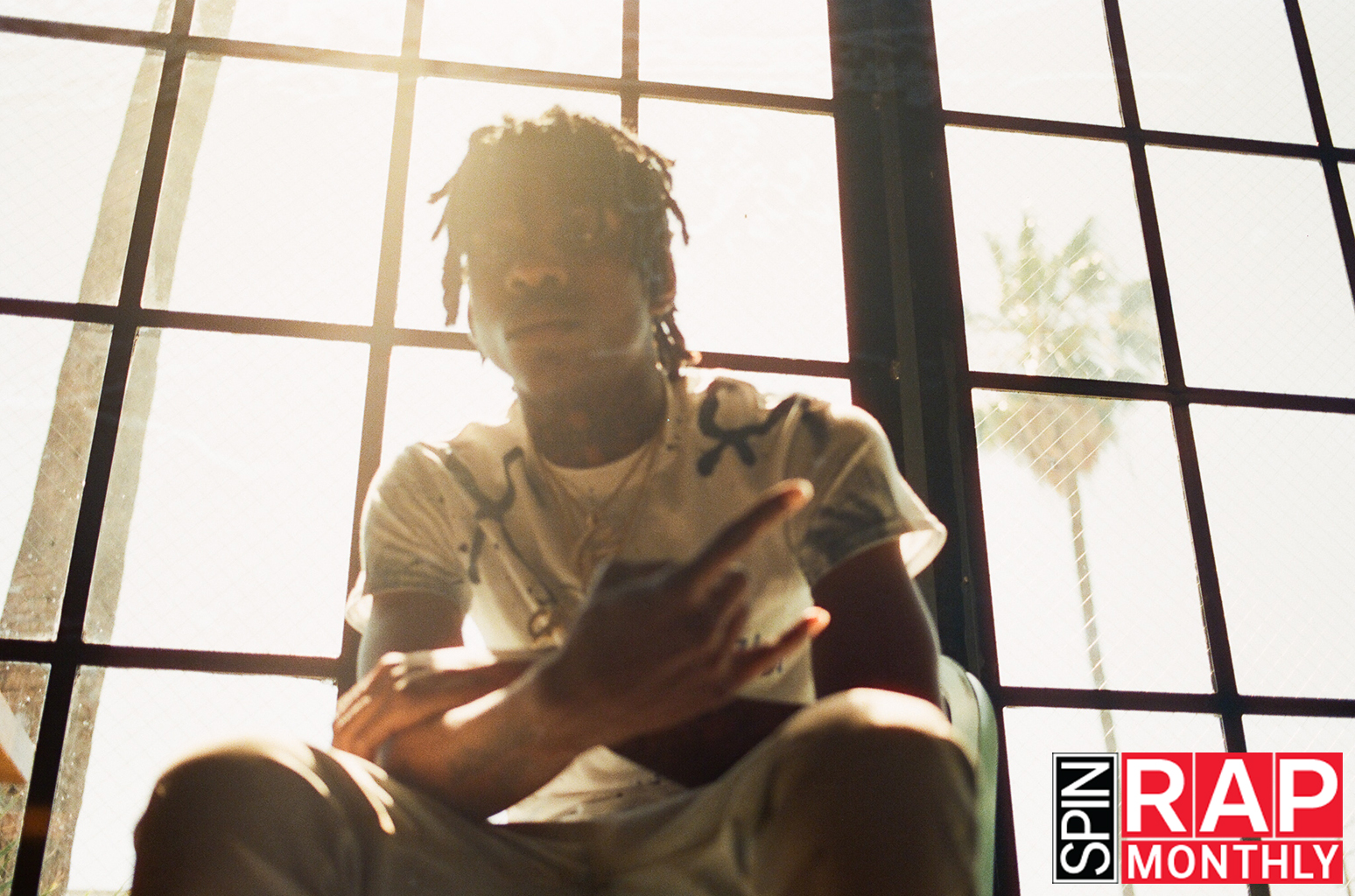Spin’s Rap Monthly column interviews an artist making waves, reviews selections from the past month, and holds some lame shit accountable.
Taurus Bartlett is halfway through lunch, explaining that Yo Gotti recently offered him industry advice, when he learns his breakout single “Pop Out” was certified platinum. We’re at Nas’ upscale chicken and waffle restaurant, tucked among the streetwear boutiques, skaters, and synagogues on Fairfax Avenue in Los Angeles, five days after Bartlett released his debut album Die a Legend. The 20-year-old baby-faced Chicago native, who raps under the name Polo G, moved to celebrity enclave Calabasas last Christmas, and sometimes ventures down from the valley to meet his barber across the street from the restaurant. He arrives at lunch in an all-white fit, save for two gold chains hoisting pendants reading “G” and “Capalot,” with his older sister (and tour manager) Leilani, girlfriend Crystal, and hometown friend Lil Blast. His Columbia Records publicist, from the corner of our private dining room, receives the email and announces the news: the rapper’s first platinum record. There’s a pause before Bartlet responds, with a straight face, “fa sho.”
Thirteen months earlier, Bartlett walked out of Cook County Jail in Chicago. He served two months for cannabis possession after being arrested the previous October, for the third time in as many months, eight miles southwest of his childhood home in the Marshall Field Garden Apartments on the city’s North Side. He would later tell interviewer DJ Vlad that he started hustling at 17 to raise money in hopes of kickstarting his music career. Bartlett released a few songs before entering the nation’s largest correctional facility, including remixes of Juvenile’s New Orleans classic “Back That Azz Up” and hometown hero G Herbo’s “Never Cared.” But he wrote the single that grabbed Chicago’s attention while he was incarcerated. Last August, “Finer Things,” a bittersweet ballad over funereal piano, unveiled a gifted melodist with a vulnerable side and intense sympathy for similarly situated kids from hypercriminalized communities. The second-person chorus (“A lot of people dyin’ and it’s a chance that you might / You got god on your side but it’s hard to do right”) feels like it’s directed at the listener and the mirror both.
The “Finer Things” video racked up nine million YouTube views in just over two months, catching the industry’s attention, too. Bartlett signed a record deal with Columbia last October. He recorded “Pop Out”—a mock-apologetic earworm about mid-party robberies and headshots, which currently sits at No. 18 on the Hot 100—in stages. In an era of spontaneously composed street rap, Bartlett writes all of his songs before entering the booth. “I want everything to, you feel me, line up and sound like a story,” he says. “All throughout the day, a line will pop up in my head. Even if it ain’t a full song, I’ll have like, four bars connected to that, sit on it, come down another time, and next shit, something else will probably pop up in my head and I’ll put it in my notes.” He laid down the “Pop Out” hook in Atlanta, but struggled to complete the record. “I had badass writer’s block,” he says, blaming anxiety on label meetings. Bartlett eventually recorded his verse, about a diamond-studded Rolex, new Wraith, and flights to California, back in Chicago after the ink on his contract dried.
Die a Legend showcases a newly moneyed version of Polo G, no less haunted but confident enough to admit as much, flaunting his lifestyle while still humbled by it. (Near the end of our meal, explaining that he listens to whole projects more frequently than he used to, Bartlett says, “Now I’m a rapper, so that’s just a thing for me.”) “Through Da Storm,” perhaps the album’s best song, built around a tearjerker toy piano-like tune, finds Polo driving through the California mountains with his phone on do-not-disturb, listening to his own music, reflecting on how his life “rerouted” and wondering whether he needs an accountant. He addresses the chorus to his late grandmother’s spirit, recalls phoning his sister from jail and his mother (and current manager; she moved to L.A., too) crying in court, and then offers the perfect triumphant boast, “Fucked a sack up at Niemans.” The family loves Los Angeles, Bartlett says, though his father still lives in Chicago. They talked over the phone on Die a Legend’s release day. “He work in a big factory and they got stations where everybody play their music,” he says. “He said on every station they was playing my song. That’s all throughout the day. He workin’ 10 hour shifts and that’s all he heard.”
After we clear the spread of wings and mac and cheese, Bartlett wants to shop. We don’t make it a block before someone asks him for a photo in front of the Bape store; some dozen bystanders watch and snap photos of their own. An older man riding a miniature bike calls out that he’s also from Chicago and offers his blessing. Inside the sneaker shop where Leilani and Crystal try on Kanye West’s apparently very comfortable boots, it takes a few minutes, but a Polo G song, “Lost Files,” eventually plays through the in-store speakers, on a playlist featuring Future, 21 Savage, and Juice Wrld. Bartlett pulls out some bills and films himself rapping along for Instagram. After we part ways, I see on his profile that he visited his barber shop next. They were playing his music there, too.
Look Back At It
In May, we enjoyed rap music that took its time and your boyfriend. These and other recommendations below.
Z Money – Shawty Paid
Z Money had something of a breakout year in 2018 with the release of Chiraq Mogul, reminding the world that he is a rapper to pay attention to. Last month, the Chicago MC shared his latest tape Shawty Paid, a record which doubles down on his genteel, turtle-paced rap style over trunk-rattling but eerie beats. Z Money has a much harder edge than the more whimsical rhymes of his frequent collaborator and stylistic foil Valee, but it works for the way his voice slinks and rises, following the movement of the production. While there’s no standout single that instantly hooks onto you like his 2018 standout “Bitcoin,” the tape’s best quality is its consistency—perfect for zoning. –Israel Daramola
Queen Key – Eat My Pussy Again
Queen Key is funny and rude, two of the most important qualities in a rapper, and she describes stealing men as well as anyone (“Take that hoe to class while I take lil’ cuz to practice / Got head from a nerd, I knock off that n*gga glasses”). The sequel to her much-hyped EP Eat My Pussy lacks a hook with as much oomph as the minor hit “My Way,” but find ways to refresh the du jour lo-fi bass-boosted production style featured on songs like “Hey” and “Ratchet.” The tape closes with two verses she wrote in high school, to which she adds an outro that shows she’s as comfortable teasing herself, “My favorite poem, you feel me? / Got me soundin’ smart as fuck.” –Tosten Burks
Curren$y and LNDN DRGS – Umbrella Symphony
Sean House, the production half of g-funk duo LNDN DRGS, furnishes his partner Jay Worthy and the well-matched guest star Curren$y with a pristine batch of down-tempo old-school soul flips that pair nicely with character-driven street wisdom. Minimal percussion and wide-open pockets privilege the pair’s narrative writing and tricky patient flows. Umbrella Symphony plays like elders recounting memories over blunts at the end of a long year. More from this threesome, please. –T.B.
Plus: Chris Crack’s Never Hated I Just Waited, vivid shit-talk over soul vocal loops that extends a prolific mixtape run; Suga Free’s The Resurrection, a welcome and proficient return from the Los Angeleno whose style has proved as locally influential as any of his peers; Psalm One’s Flight of the Wig, witty battle raps about patriarchy; and Nelson Bandela’s Niggas Wit Stretchmarks, a brief set of funky digressions on the relationship between art, success, and mental health.
Get Out the Way
Published novelist Logic’s latest album Confessions of a Dangerous Mind features a Will Smith punchline about Fortnite, an Eminem collaboration that rhymes “Slim Shady” with “rabies,” and multiple songs complaining about social media, but the most banal track is “Cocaine,” a self-impressed trap-ish “meta”-commentary on rap music promoting drugs. (It would be eye-rolling even if J. Cole didn’t just last year release a concept album based on the same idea.) He raps, “I don’t really wanna glorify it but the streets glorify it / So I gotta glorify it ‘fore the people throw a riot / If I don’t talk about it on my album they won’t buy it,” missing the fact that this type of moralizing is the entire point of his (very successful) career. –T.B.





